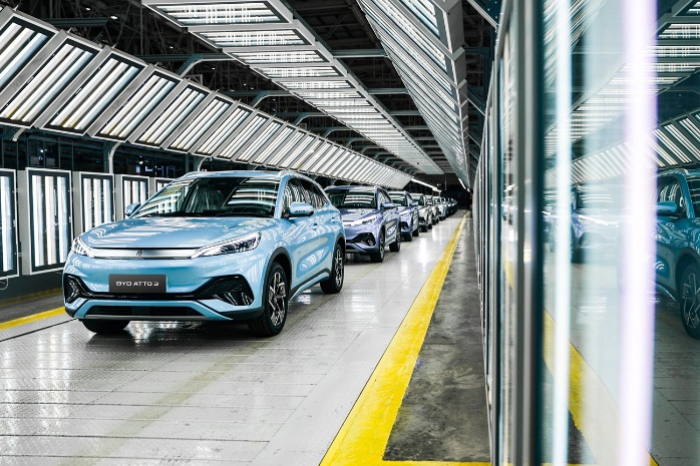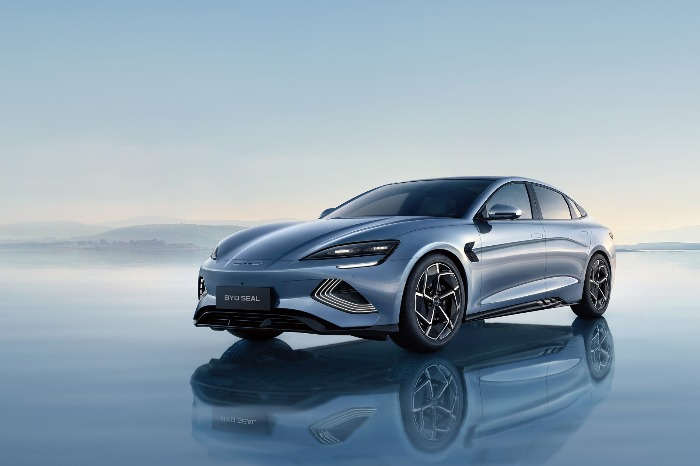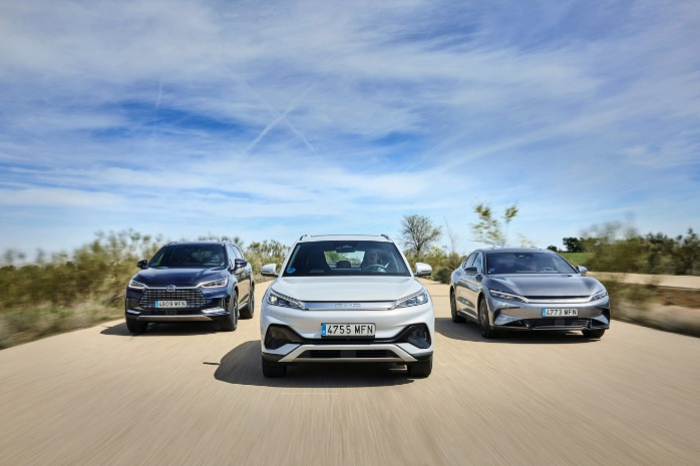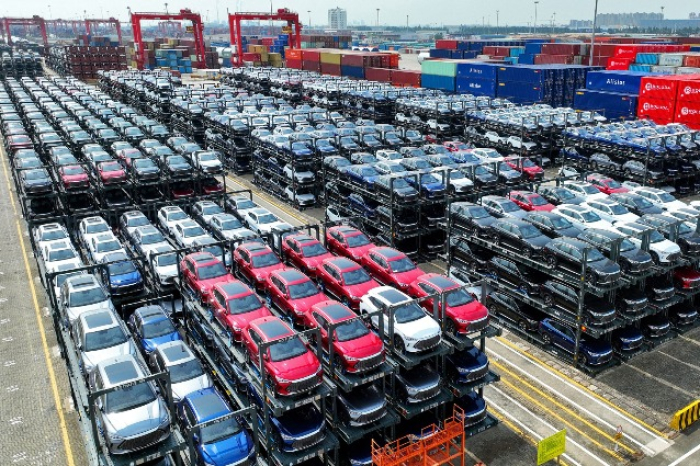BYD to debut passenger EVs in South Korea in 2025
It is expected to roll out the midsize EV sedan Seal and electric Atto 3 compact SUV to rival the Hyundai IONIQ 6 and Kia EV3
By Nov 13, 2024 (Gmt+09:00)
LG Chem to sell water filter business to Glenwood PE for $692 million


KT&G eyes overseas M&A after rejecting activist fund's offer


Mirae Asset to be named Korea Post’s core real estate fund operator


StockX in merger talks with Naver’s online reseller Kream


Meritz backs half of ex-manager’s $210 mn hedge fund



China’s electric vehicle giant BYD Co. will debut in the South Korean passenger car market next year with premium models in hopes of becoming the first Chinese car brand to steal Korean consumers’ hearts, following years of its Chinese peers' failure to meet Korean drivers’ high expectations.
The Shenzhen-based EV maker is set to start selling its passenger EVs in Korea in early 2025 after “through market evaluation,” its Korean operation announced on Wednesday.
BYD Korea said the company is currently setting up the brand’s sales and service network across Korea, hiring staff, undergoing the country’s necessary state evaluations to get certified to sell its cars, setting up marketing strategies and training staff.
Earlier this year, the Korea Economic Daily exclusively reported that the world’s largest EV producer was seeking permits from Korea’s related state agencies to sell its passenger EVs in Korea.
BYD has been selling commercial vehicles such as buses and trucks in Korea since 2016 but not passenger EVs.
Its Chinese rivals have previously attempted to crack the Korean passenger car market, including BAIC Motor Corp.’s KENBO 600, but none has succeeded in winning Korean consumers’ hearts mainly due to their quality and safety issues.
CARS WITH PREMIUM FEATURES

BYD did not disclose which models it will roll out first in Korea but the auto industry expects the Chinese EV giant to bring its midsize EV sedan Seal and electric compact sport utility vehicle Atto 3 to the country.
“We have thoroughly examined (the Korean passenger car market) with employees and partners with diverse experiences to meet the high expectations of Korean consumers,” said Cho In-chul, managing director of BYD Korea’s passenger car division.
“We will strive to become a trusted brand among Korean consumers with our successful global expansion strategy and outstanding technology.”
The BYD Seal is a midsize EV sedan, which is expected to compete with Hyundai Motor Co.'s IONIQ 6 and Tesla Inc.’s Model 3 in Korea.
The BYD Seal runs up to 569 kilometers on a single charge, longer than the Model 3’s 511 km. It is expected to be priced in the mid to high 40 million won ($28,455) range in Korea.
Its best-seller and first global model, the Atto 3, which can run 420 km on a single charge, is expected to rival Kia Corp.'s EV3 in the country. It sells for about 44 million won in Australia and Japan but is expected to be priced below that level in Korea.

Depending on its success, BYD is expected to accelerate its advance into Korea with more high-end segment models such as the HAN series or its luxury separate brand Denza cars later, according to sources.
The company has already registered the trademark of Denza in Korea. It has also registered the trademarks of its two EV sedans – the Seal and the hatchback Dolphin – with Korean authorities earlier this year.
BYD has obtained environmental certification for the Atto 3 from Korea’s Ministry of Environment and is waiting for the same certification for the Seal.
It takes about two to three months for the related evaluation but the process to review the Seal has been taking longer, which, however, is not unusual, said the Korean environment ministry although it is not yet sure when it will issue the certification for the model.
But the Seal has already obtained certifications for its driving range and energy efficiency from Korea’s Ministry of Trade, Industry, and Energy, and its specifications have been already reported to the country’s transportation ministry for domestic sale.
To sell electric models in Korea, foreign automakers need to obtain environmental and safety certifications for their vehicles’ driving range, energy efficiency and battery safety, and undergo an eligibility review for state EV subsidies.
THREAT TO KOREAN EVS?

BYD, which rose to the top in the global EV market last year after beating Tesla, is considered the most formidable rival to Korean EVs, which have been grappling with dwindling demand amid the ongoing EV chasm.
Given the EV chasm, BYD may bring its hybrid models to Korea, said an official in the Korean auto industry.
The Chinese EV giant sold more than 3 million units of environmentally friendly cars worldwide in 2023, and it raked in $69.3 billion in global car sales in the first three quarters of this year, up 18.9% from the same period of last year.
But the key to its success in the Korean passenger car market is quality, said industry observers.
If it fails to meet Korean consumers’ high expectations for quality and safety, BYD will suffer the same fate as its Chinese peers, which sold only a few hundred units in the country.
In late October, the European New Car Assessment Program (Euro NCAP), which is Europe’s car safety agency, issued a “not recommended” rating on the driver assistance system used in the BYD Atto 3.
Write to Jung-Eun Shin and Jin-Won Kim at newyearis@hankyung.com
Sookyung Seo edited this article.
-
 LogisticsHyundai Glovis, BYD seek strategic alliance on car exports
LogisticsHyundai Glovis, BYD seek strategic alliance on car exportsSep 25, 2024 (Gmt+09:00)
2 Min read -
 Corporate strategyHyundai Motor cuts 2030 sales goals as EV chasm likely protracted
Corporate strategyHyundai Motor cuts 2030 sales goals as EV chasm likely protractedSep 19, 2024 (Gmt+09:00)
3 Min read -
 Electric vehiclesKia premieres EV3 to boost global electrification push
Electric vehiclesKia premieres EV3 to boost global electrification pushMay 23, 2024 (Gmt+09:00)
3 Min read -
 Electric vehiclesHyundai’s IONIQ 6: Most efficient electric vehicle in US
Electric vehiclesHyundai’s IONIQ 6: Most efficient electric vehicle in USMar 04, 2024 (Gmt+09:00)
2 Min read -
 Electric vehiclesChina’s BYD to enter South Korea’s passenger electric car market
Electric vehiclesChina’s BYD to enter South Korea’s passenger electric car marketFeb 12, 2024 (Gmt+09:00)
3 Min read -
 AutomobilesKG Mobility, BYD to team up for battery pack, hybrid car
AutomobilesKG Mobility, BYD to team up for battery pack, hybrid carNov 02, 2023 (Gmt+09:00)
1 Min read -
 Electric vehiclesHyundai faces growing rivalry with China’s BYD in Southeast Asia
Electric vehiclesHyundai faces growing rivalry with China’s BYD in Southeast AsiaSep 14, 2022 (Gmt+09:00)
2 Min read -
 Electric vehiclesHyundai to debut IONIQ 6 in July to rival Tesla Model 3
Electric vehiclesHyundai to debut IONIQ 6 in July to rival Tesla Model 3Feb 07, 2022 (Gmt+09:00)
2 Min read


